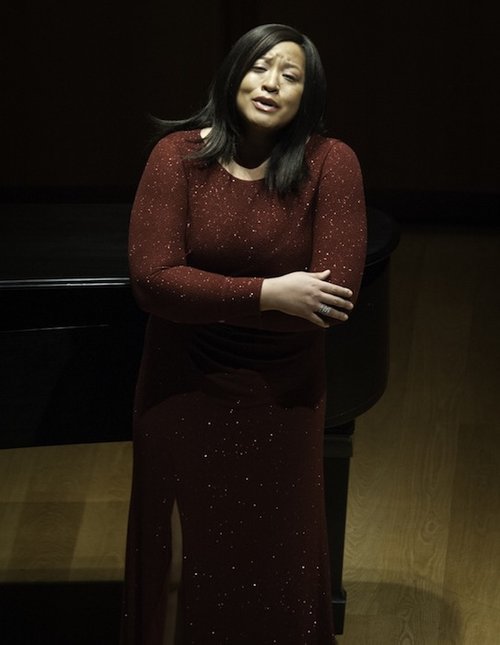Soprano Bradley soars high in recital for Friends of Chamber Music
In 2016 soprano Michelle Bradley, then a member of the Metropolitan Opera’s Young Artist Development Program, made her Miami debut in a recital for Friends of Chamber Music. She demonstrated exceptional vocal gifts that marked her as a highly promising future operatic heroine.
Bradley returned on Thursday night to Julian Kreeger’s long-running series and there was no doubt that this young singer was now a more polished, successful artist. Her active career now spans major opera and concert engagements in Europe and the Americas.
The intimacy of the sanctuary at Temple Beth Am in Pinecrest was perfect for Bradley’s gracious presentation. Her running commentary between selections combined wit and charm with vital contextual information, particularly for the operatic excerpts. With Ken Noda at the piano providing stellar support in widely diverse repertoire, Bradley’s program was a feast of splendid vocalism and a harbinger of great things to come.
Bradley has played the role of Donna Anna in Mozart’s Don Giovanni and she opened with that heroine’s aria “Non mi dir.” She displayed superb control of her voluminous instrument. Bradley’s high notes gleamed and she molded Mozart’s phrases with long spun elegance. At full strength, her outpouring of radiant tone and seamless projection, with no scooping between registers, brought vibrant life to Donna Anna’s plea to her lover. Bradley’s accurate coloratura runs in the coda capped a stylish and vocally luxuriant performance.
Samuel Barber’s Hermit Songs were written in 1953 and premiered by the legendary Leontyne Price. The ten-song cycle is based on texts by Irish monks from the 8th to 13th centuries in translations by W.H. Auden among others.
Bradley encapsulated the essence of each of these vignettes, the moods shifting from humor and playfulness to anguish. Bradley sang “At St. Patrick’s Purgatory,” the opening song, with the gutsy aura of a gospel singer, reflecting her own musical roots in the church. The brief, “Church Bells at Night” is prime Barber and Bradley’s silvery high tones were plush icing on this lyrical confection. She captured the testament of faith in “St. Ita’s Vision” with great emotion and feeling. Noda’s whirling keyboard figurations were articulated with consummate artistry.
“The Heavenly Banquet” was appropriately light and jubilant. Bradley’s deep lower register conveyed the depth of pain in “The Crucifixion.” Noda’s dissonant keyboard lines added spice to the shanty-infused “Sea Snatch.” Bradley insinuated the sexual allure of “Promiscuity” with a lithe touch and she brought the ease of a pop chansonnier to the folksy melodic strokes of “The Monk and his Cat.” “The Praises of God” were proclaimed in fierce declamation and Bradley turned “The Desire for Hermitage,” the cycle’s final song, into a mini drama of operatic proportions. She encompassed Barber’s varied musical palette with refined artistry and tonal allure, seconded by Noda’s idiomatic underpinning.
Bradley is a true Verdi soprano and recently sang her first Aida at the Opéra National de Lorraine in Nancy, France. She opened the second half of the concert with the Ethiopian princess’s “O patria mia.” The sheer fervor and ease of projection in her evocation of the heroine’s longing for her ravaged homeland were thrilling. There was both fire and subtlety in her performance, the final pianissimo meltingly beautiful.
Bradley’s rounded, multi-colored voice is also ideal for Strauss. She had the lustrous tonal compass and grand sense of musical line for “Es gibt ein Reich” from Ariadne auf Naxos. She skillfully brought forth Ariadne’s mood swings from despair to joy as she awaits the return of her departed lover. At the big Straussian climaxes, her top tones rang through the hall without ever turning harsh.
In four Strauss lieder, Bradley winningly conveyed the composer’s more intimate side. She conjured up the fun and happiness of young love in “Staendchen” with a softer sound and brought nobility to “Ich trage meine Minne.” The soft opening of “Freundliche Vision” was exquisite while the full-voiced proclamation of “Caecilie” found Noda playing with almost orchestral power and weight.
A standing, cheering ovation brought three encores. Bradley thanked the audience for their attentiveness and warm response before sitting down at the piano to accompany herself in “The Lord’s Prayer.” She sang Albert Hay Malotte’s setting with obvious sincerity, devotion and a touch of the soul-tinged exuberance of a Mahalia Jackson. Turning back to Verdi (with Noda again at the keyboard), “Pace, pace mio dio” from La Forza del Destino emerged throbbing and intense in a voluptuous stream of pure tone.
Although Bradley is a soprano rather than a contralto, few artists have sung the spiritual “He’s Got the Whole World in His Hands” with such heartfelt fervor since the great Marian Anderson. Her deeply felt declaration of faith was a riveting conclusion to an outstanding evening of opera and song.
Friends of Chamber Music presents the Kalichstein-Laredo-Robinson Trio and violist Cynthia Phelps playing Brahms’ Piano Quartets Nos. 2 and 3 January 7, 2019 at Temple Beth Am in Pinecrest. miamichambermusic.org; 305-372-2975
Posted in Performances
Leave a Comment
Fri Dec 7, 2018
at 12:02 pm
No Comments





